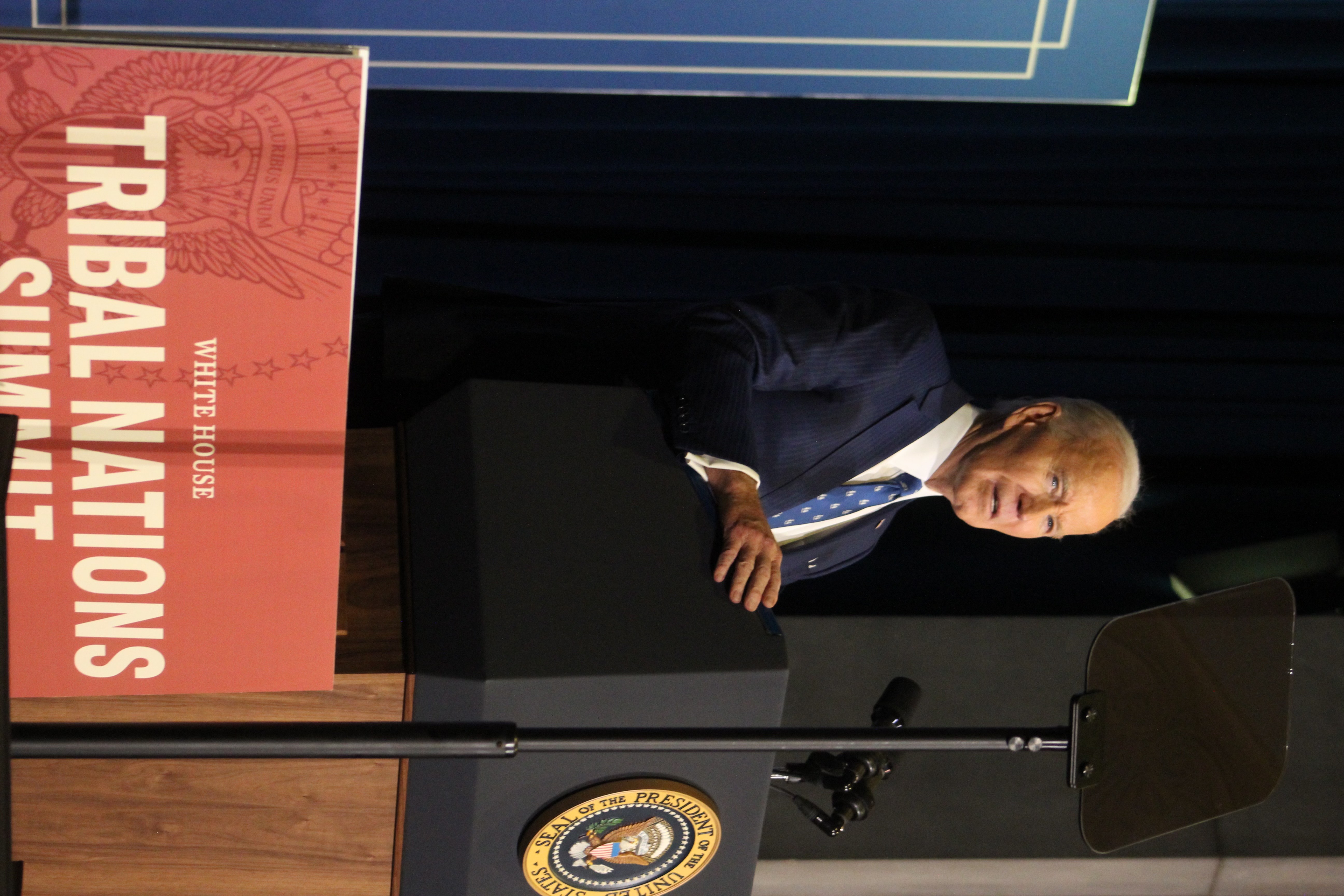
- Details
- By Levi Rickert
WASHINGTON — On Monday afternoon, President Joe Biden received a standing ovation from tribal leaders at the 2024 White House Tribal Nations Summit in Washington, D.C. As part of the welcome, he was presented with a Native blanket by Interior Secretary Deb Haaland (Laguna Pueblo) and Assistant Secretary of Indian Affairs Bryan Newland (Bay Mills Indian Community).
The blanket was presented to the president in recognition of the unprecedented attention the Biden-Harris administration gave to Indian Country over the past four years. This included allocating more than $45 billion to Native communities and nominating Haaland as Secretary of the Interior. Upon her Senate confirmation, Haaland made history as the first Native American to serve in a presidential cabinet position.
President Biden humorously remarked that the blanket, crafted by Eighth Generation, would have been a fitting addition to last week's White House National Christmas Tree Lighting Ceremony.
“I could’ve used that blanket when I was lighting that Christmas tree,” Biden said. “Both of us were freezing.”
Monday’s summit was the fourth and last of the Biden-Harris administration. The president will leave office on January 20, 2025.
Typically at the summits, a major announcement relating to Indian Country is made. This year’s announcement came with a proclamation that designated the Carlisle Federal Indian Boarding School a national monument.
“About 7,800 children from more than 140 tribes were sent to Carlyle — stolen from their families, their tribes and their homelands. It was wrong making the Carlisle Indian school a national model,” Biden told the White House summit. “We don’t erase history. We acknowledge it, we learn from it and we remember so we never repeat it again.”
The proclamation fulfills another recommendation made in the Federal Indian Boarding School Initiative Investigative Report, Volume II released this past summer.
Monday’s action builds on Biden’s historic Presidential apology at Gila River Indian Community and the leadership of Secretary of the Interior Deb Haaland to establish and lead research and listening sessions with Tribes and Native communities across the country as part of the Federal Indian Boarding School Initiative.
The president stressed the importance of the monument that will serve as a reminder of the horrific part of American history where Native Americans were taken from their homes and placed into Indian boarding schools. Many of the students were subjected to physical, emotional, and sexual abuse.
“I don’t want people forgetting 10, 20, 30, 50 years from now, pretending it didn’t happen,” the president said of the government effort to Westernize Native Americans.
The children sent to the repurposed Carlisle, Pa., Army barracks were “stolen from their families, their tribes and their homelands,” Biden said.
“It was wrong,” he declared.
“We don’t erase history. We acknowledge it, we learn from it and we remember so we never repeat it again,” Biden added. “We remember so we can heal. That’s the purpose of memory.”
Create your own user feedback surveyMore Stories Like This
Native News Weekly (August 25, 2024): D.C. BriefsScope Narrowed, Report Withheld: Questions Mount Over Michigan Boarding School Study
Zuni Youth Enrichment Project Announces Family Engagement Night and Spring Break Youth Programming
Next on Native Bidaské: Leonard Peltier Reflects on His First Year After Prison
Deb Haaland Rolls Out Affordability Agenda in Albuquerque
Help us defend tribal sovereignty.
At Native News Online, our mission is rooted in telling the stories that strengthen sovereignty and uplift Indigenous voices — not just at year’s end, but every single day.
Because of your generosity last year, we were able to keep our reporters on the ground in tribal communities, at national gatherings and in the halls of Congress — covering the issues that matter most to Indian Country: sovereignty, culture, education, health and economic opportunity.
That support sustained us through a tough year in 2025. Now, as we look to the year ahead, we need your help right now to ensure warrior journalism remains strong — reporting that defends tribal sovereignty, amplifies Native truth, and holds power accountable.
 The stakes couldn't be higher. Your support keeps Native voices heard, Native stories told and Native sovereignty defended.
The stakes couldn't be higher. Your support keeps Native voices heard, Native stories told and Native sovereignty defended.
Stand with Warrior Journalism today.
Levi Rickert (Potawatomi), Editor & Publisher

